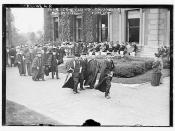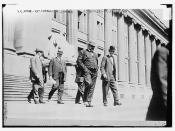Butler's first chapter shows the decline of Indian populations due to disease, the dramatic decline in the proportion of English colonists and the tragedy of the slave trade, and the largest forced human migration in history, which brought more Africans than Europeans to England's mainland colonies from 1700 to 1770. The account of slavery highlights its brutality and stresses that Americans did not inherit but created the modern system of human and legal interrelationships. He contends that the main reason for the expansion and tightening of the slave system was simple: profit. Butler does discuss other factors, including the decline in the availability of indentured servants, the failure of attempts to enslave Indians, and the cultural predispositions of Europeans to perceive Africans as different, disagreeable, and dispensable, ideal candidates for enslavement. His descriptions of the colonies' extraordinary economic growth from 1680 to 1770, the rapid development of domestic and international markets for the agricultural products that were central to all the colonies' economies, the taking of Indian lands, the division of labor that prevailed everywhere and the increasing gap separating the richest from the poorest Americans, especially slaves, are excellent.
He judges all colonists accomplices in the slave system and the destruction of Indian cultures. European settlement throughout the colonies ultimately had the effect of enslaving or oppressing Africans and attacking or infecting Indians. He concludes the chapter by pointing out, persuasively, that in these provinces of plenty, the patterns of wealth and poverty demonstrated how the experience of wealth and impoverishment descended not from the land, but from human innovation, I wanted to know the reasons the colonists themselves offered, or the arguments they had with each other, as they tried to justify the cultures they were inventing, but Butler didn't list them.
Butler argues persuasively that America during...


